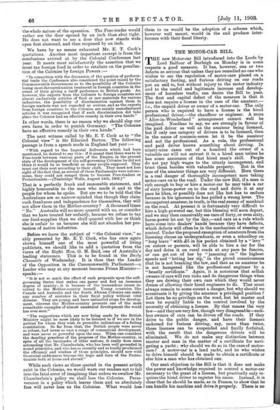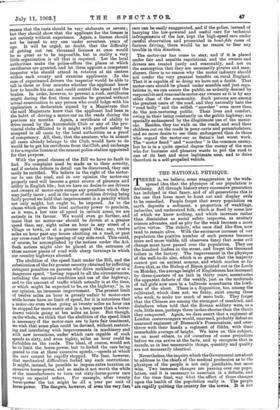THE MOTOR - CAR BILL. T HE new Motor-car Bill introduced into the
Lords by Lord Balfour of Burleigh on Monday is in some respects a good measure. It has, however, one or two defects so serious that unless they are remedied no one who wishes to see the regulation of motor-cars placed on a satisfactory footing, and furious driving on our roads put an end to, but without injury to the motor industry and to the useful and legitimate increase and develop- ment of horseless traffic, can desire the Bill to pass. The first and capital defect of the measure is that it does not require a license in the case of the amateur,- i.e., the unpaid driver or owner of a motor-car. The only person who is required to have a license is the hired professional driver,—the chauffeur or engineer. A more " Alice-in-Wonderland " arrangement cannot well be imagined. Needless to say, we are strongly in favour of the paid. driver as well as the amateur being licensed, but if only one category of drivers is to be licensed, then in the name of common-sense let it be the amateur and not the professional. As a rule, the professional and paid driver knows something about driving. In ninety-nine cases out of a hundred the owner of a valuable car will not entrust it to a hired man unless he has some assurance of that hired. man's skill. People do not pay high wages to the utterly incompetent, and trust them besides with valuable property. But in the case of the amateur things are very different. Here there is a real danger of thoroughly incompetent men taking motor-cars on to the road. Under the new Bill, if a man is rich enough to buy or hire a motor-car he may take a car of sixty horse-power on to the road and drive it at any pace he likes, or possibly does not like but has to endure because in his ignorance he has pulled a• wrong lever. The incompetent amateur, in truth, is the real enemy of mankind on the road. At present it is fortunately very difficult to hire a high-powered car, but this blessing will soon depart, and we may then conceivably see cars of forty, or even sixty, horse-power let out by the day,—and cars as a rule which have come into dealers' hands because they have defects, which defects will often be in the mechanism of steering or control. Under the proposed exemption of amateurs from the licensing clause an undergraduate, or even a schoolboy on " long leave " with £5 in his pocket obtained by a " levy " on sisters or parents, will be able to hire a car for the day and drive it on rural roads at any pace he fancies, or can get out of her by "jamming on " the highest speeds and " letting her rip," in the proud consciousness that he is not breaking the law, and that as an amateur he is not hampered like the professional engineer by a "beastly certificate." Again, it is notorious that selfish owners of cars will run risks and do dangerous things when they are driving their own cars which they would never dream of allowing their hired engineers to do. That must always remain to some extent a danger, but why should we accentuate it by giving the amateur a privileged position ? Let there be no privilege on the road, but let master and man be equally liable to the control involved by the necessity of obtaining a license. By that means the very few—and they are very few, though very disagreeable—reck- less owners of cars can be driven off the roads. If they drive to the public danger, and have their licenses endorsed for furious driving, say, more than twice, those licenses can be suspended and finally forfeited, with the result that the dangerous drivers will be eliminated. We do not make any distinction between master and man in the matter of a certificate for navi- gating a yacht ; why should we do so in the case of motor- cars ? A motor-car is a land yacht, and he who wishes to drive himself should be made to obtain a certificate or else hire a man who has obtained one.
Our next objection to the Bill is that it does not make the power and knowledge required to control a motor-car necessary to the grant of a license, but practically only re- quires the hired driver to register his name. Instead, it is clear that he should be made, as in France, to show that he can handle his machine and drive it properly. There is no reason that the tests should be very elaborate or severe ; but they should show that the applicant for the license is not entirely without experience. Again, a license should not be issued to any one under seventeen years of age. It will be urged, no doubt, that the difficulty of getting out ten thousand licenses at once would be so great as to be impossible, but in reality a very little organisation is all that is required. Let the local authorities make the police-offices the places at which certificates are granted, and let them appoint a competent inspector who should attend in rotation at six centres within each county and examine applicants. In the case of experienced drivers the inspector would be able to tell in three or four minutes whether the applicant knew how to handle his car, and could control the speed and the brakes. In order, however, to prevent a rush, certificates might during the first three months be granted without actual examination to any person who could lodge with his application a declaration signed by a Magistrate that the said Magistrate knew that the applicant had been in the habit of driving a motor-car on the roads during the previous six months. Again, a certificate of ability to drive issued by the Automobile Club or any of the pro- vincial clubs affiliated to it might with perfect safety be accepted in all cases by the local authorities as a proof of competency. All, then, that the amateur, who in almost all cases already belongs to the Club, would have to do would be to get his certificate from the Club, and exchange it for a regular license at the nearest police-station appointed for that purpose.
With the penal clauses of the Bill we have no fault to find. No complaint need be made as to their severity, and if certain defects in detail can be discovered, they can easily be rectified. We believe in the right of the motor- car to use the road, and in our opinion the motor-car properly used will become a great source of pleasure and utihty in English life ; but we have no desire to see drivers and owners of motor-cars escape any penalties which they may justly incur ; and in the case of reckless driving being fairly proved we hold that imprisonment is a penalty which not only might, but ought to, be imposed. As to the clause which gives the local authority power to proclaim, as it were, a low rate of speed in certain areas, we are entirely in its favour. We would even go further, and insist that no motor-car should be driven at a greater speed than, say, eight miles an hour in any street of a village or town, or at a greater speed than, say, twelve miles an hour past any house abutting on a road, or past any cross-road or the opening of any side-road. This could, of course, be accomplished by the notices under the Act. Such notices might also be placed at the entrance of those narrow pieces of road with sharp turnings in which our country highways abound.
The abolition of the speed limit under the Bill, and the substitution of the far greater security obtained by inflicting stringent penalties on persons who drive recklessly or at a dangerous speed, " having regard to all the circumstances, including the natural condition and use of the highway, and to the amount of traffic which actually is at the time, or which might be expected to be, on the highway," is, in our opinion, an immense improvement. The present limit of twelve miles an hour is grossly unfair to motor-cars while horses have no limit of speed, for it is notorious that a motor-car even when going at twenty miles an hour can be stopped far more easily and in a less space than a horse- drawn vehicle going at ten miles an hour. But though, on the whole, we think that the abolition of the speed limit is necessary if the motor-cars are to have fair treatment, we wish that some plan could be devised, without restrict- ing and interfering with improvements in machinery and with new inventions, under which cars capable of such speeds as sixty, and even eighty, miles an hour could be forbidden on the roads. The ideal, of course, would not be to limit the horse-power, but to forbid the cars being geared to run at these excessive speeds,—speeds at which the cars cannot be rapidly stopped. We fear, however, that mechanical difficulties forbid any such restrictions. It might, instead, be possible to impose extra taxation on excessive horse-power, and so make it not worth the while of the manufacturers to turn out sixty-horse-power cars except on special orders. For example, after twenty horse-power the tax might be a year per unit of horse-power. The dangers, however, of even the very fast cars can be easily exaggerated, and if the police, instead of harrying the low-powered and useful cars for technical infringements of the law, kept the high-speed cars under careful observation and prosecuted in bona fide cases of furious driving, there would be no reason to fear any trouble in this direction.
The motor-car has come to stay, and if it is placed under fair and sensible regulations, and the owners and drivers are treated justly and reasonably, and not on the assumption that they are necessarily pirates and man- slayers, there is no reason why the motor industry should not confer the very greatest benefits on rural England. That it is capable of so doing we have not a doubt. That motor-cars should be placed under sensible and just regu- lations is, we can assure the public, as ardently desired by responsible and reasonable motor-car owners as it is by any other class of the community. Such persons are among the greatest users of the road, and they naturally hate the " road bully " and the selfish " scorcher " even more than do the non-motoring public. Their lives and comfort, owing to their being constantly on the public highway, are specially endangered by the illegitimate use of the motor- car. Besides, they too walk on. the roads, and send their children out on the roads in pony-carts and perambulators, and no more desire to see them endangered than do those who regard the motor-car as Satan's last worst work. The " motor fiend" and " scorcher " is the common enemy, but he is in a quite special degree the enemy of the man who for business and pleasure wants to put the road to one of its best and most legitimate uses, and to drive therefore in a self-propelled vehicle.







































 Previous page
Previous page